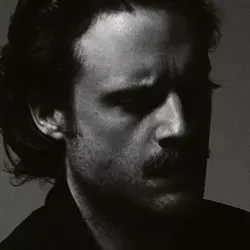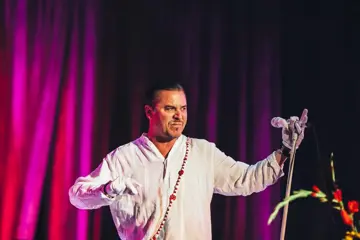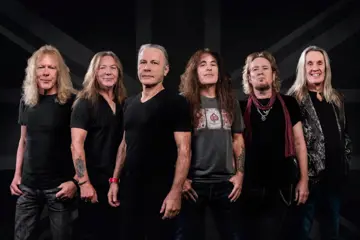 Father John Misty
Father John MistyJosh Tillman, otherwise and now more widely known as Father John Misty, surprised many with his 2012 album, Fear Fun. The name change was the least part of it. Traditionally, Tillman's albums (2009's Vacilando Territory Blues, 2010's Singing Ax) had been moderately lo-fi folk albums, building on themes that could be found across the whole gamut of pastoral folk music. Then, this year, Fear Fun dropped onto shelves with a ridiculously colourful and psychedelic cover: Tillman himself in glaring blue and yellow hue, surrounded by bleeding eyeballs and smiling cats. It marked a grand departure of the old “appreciated but unknown” folk character that Tillman had idolised in musicians like Townes Van Sandt, Nick Drake and Gram Parsons, and a reliance on his own mind as the source of his creative ability.
That change comes through clearly when in conversation with Josh Tillman. He worries little about creating a persona, more about being honest. “It's pretty end-of-the-day, so you'll get a pretty candid version,” Tillman begins on brief reprieve from his ongoing touring duties. “I'm never going to be any younger than I am now,” he adds, “I can deal with it.” He then waxes slightly lyrical about the current state of the tour, and how he feels about presenting himself so frankly to people all around the world. “It's a financial windfall,” he states sardonically. “It's a creative failure, but it's financially viable. It's what Nietzsche called 'diseased music'.”
A Nietzsche reference isn't entirely unexpected. Tillman's creative bodies of work have often seemed to reference philosophical ideas, especially on the idea of perspective and voice. So then is his adoption of the Father John Misty moniker, so exemplified in relation to the release of Fear Fun, and the completely contradictory creative direction he has apparently taken. “Actually, the name wasn't really that important,” he clarifies. “That was like the last thing to go. It's not like you come up with a new name and all of a sudden you're like, inspired to write songs. I know what you're saying; there's this idea that the name was emblematic of some big change. But I think the impetus to write differently doesn't really have anything to do with furthering my career or anything. I don't know, it's not like I was doing it for popularity's sake. I had to do it, otherwise I wasn't going to survive creatively.”
So less about the name, and more about the music. While Tillman's unmistakable voice and the same two-stepping guitar strums build the foundation of Fear Fun, the lyrical content and the overall sense of perspective are new ground. It swells in the orchestral environments of Funtimes In Babylon and crashes in the stinging abrasiveness of Hollywood Forever Cemetery Sings. It is a much more philosophical album than his previous work. “I really feel like I kind of accomplished what I had gone there to do,” Tillman says of his previous releases. “I think [Fear Fun] is indicative and is the best kind of decoder ring as far as the creative shift goes, but I can tell you that the process of writing the novel for the album was a really big factor. That was, I guess, a non-musical environment where I could expand and explore my narrative and my creative voice.” The novel that Tillman refers to is the one in which he found the frame for Fear Fun. He had dissasociated himself from his songs during his time as drummer for Fleet Foxes, and was in dire need of another muse.
Don't miss a beat with our FREE daily newsletter
“I think the biggest difference in the whole scheme, and the most elegant explanation is, that I came to this really good understanding of writing in my conversational voice, as opposed to writing in a writer's voice,” he explains. “I think that people who I've known for a long time who have given me feedback have just said that it sounds like me. And I think that was the prime directive of the whole thing, creatively.”
In a sense, the production of Fear Fun, and the space Tillman finds himself in as an artist, is one that he feels comfortable with now; he seems to relish the confidence that this new angle in his career has given him. His humble personality even limited the worry he felt about people seeing the new direction he was going in and being turned off the whole thing. “Well, I guess it wasn't really worry; worry indicates that I had some inkling that it was gonna be well-received, which I did not,” he states matter-of-factly. “I wasn't worried, like riding the atomic bomb down to the ground, screaming, 'Yeehar!' the whole time; like this very self-reflexive thing. It's not a very cool narrative, in the end. People keep saying, 'Oh, it must have been shocking or a really big deal to change creative direction.' That isn't a big deal to me; that's something creative people do. So to me it felt very par for the course. It was like, 'Well, naturally', like you've done this change dramatically to give greater access to yourself, and your music has to reflect that. I was just kind of following the grain.
Father John Misty will be playing the following shows:
Friday 15 February - Chevron Festival Gardens, Perth WA
Sunday 17 February - The Hi-Fi, Melbourne VIC
Tuesday 19 February - The Metro, Sydney NSW
Wednesday 20 February - The Zoo, Fortitude Valley QLD















